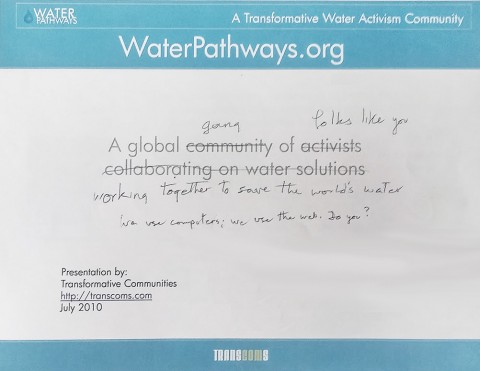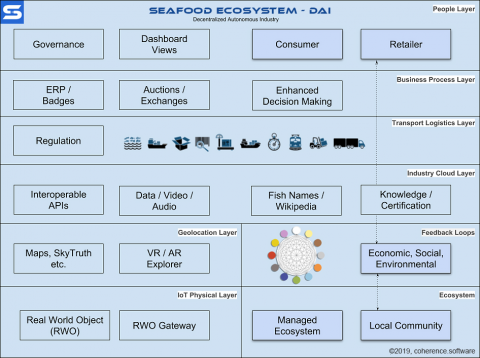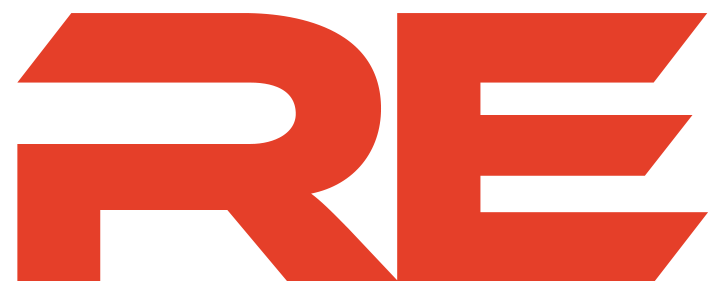- Home
- Our Newspaper
- Planet
- Seafood Ecosystem - Why Save the Oceans?
Seafood Ecosystem - Why Save the Oceans?
Article originally published in Seafood Seafood Ecosystem
Through generations of mismanagement and lack of understanding, our oceans have suffered greatly. Some refer to this as The Tragedy of the Commons. Healing the harm done to the oceans and encouraging good stewardship of this resource as a “Commons” is the goal of the Seafood Ecosystem. The oceans can be healed from this crisis. By combining input and governance from the seafood industry with modern industry-based consensus and open-source software best practices for innovation, the Seafood Ecosystem will create a dynamic and evolving foundation extending our vision to ocean regeneration and market growth.
"It's not dark yet but it's getting there." —Bob Dylan, Time Out of Mind
As we move into the next decade, alarm bells have sounded too late to solve the oncoming climate catastrophes we are about to face. At the same time, we are in the most transformative era in history, as the old systems collapse, we can still look to the human spirit and ingenuity to attempt to steer us away from the most tragic outcomes.
The 2019 Global Assessment Report on Biodiversity and Ecosystem Services one of the most sweeping (and startling) on the state of the planet's natural systems, based on thousands of scientific studies and authored by hundreds of international experts offers a very bleak assessment for our future.
The assessment estimates that current extinction rates could be up to hundreds of times higher than at any other point in the past 10 million years. At sea, a third of marine mammals, reef-forming corals, sharks, and shark relatives are on the brink. Life on land isn't faring any better. Humans have significantly altered three-quarters of the earth's land area, leaving more than half a million species without enough habitat to survive. Around 40 percent of amphibians are in jeopardy, and some of our most charismatic species—giraffes, grizzly bears, and right whales—are in dire need of our help. Others, such as the Caribbean monk seal, Spix macaw, and northern white rhino are either already gone or clinging to existence in captivity.
Ecosystems are complex, adaptive systems comprised of multi-dimensional information sources that grow, evolve, and co-evolve. Ecosystems are also paradoxical in that all of their complexity can be boiled down to simple rules that drive them. Observing the nature of ecosystems, we are creating new approaches to solving large, complex challenges by tackling their underlying components. The Seafood Ecosystem, specifically, looks to solve the challenge of our planet's deteriorating oceans and the ever-present concern of food safety.
The History
The origins of what has now become the Seafood Ecosystem started slightly over 10 years ago. I had recently left a job as Solutions Director at TBWA\Chiat\Day, Apple Computer's advertising agency where we were tasked with developing the company's enterprise infrastructure without using the standard Microsoft solutions. This was challenging at the time and we increasingly became aware of the high value of open-source software. I then met Harvey Newman, an Interfaith Minister at a United Nations event and together we began to advocate for the high value and potential of open-source software and culture.
We then met two amazing individuals Pete Seeger and Andrew Harvey. First, we met author Andrew Harvey at a United Nations meeting where he introduced his approach to Sacred Activism, Andrew's inspired approach led Harvey and me to form the Transformative Communities website as a consultancy focused on technology and social development in a living universe.
At the same time, we became involved with the NYC Friends of Clearwater. For those unfamiliar with the effort, Pete Seeger, folk music legend and environmental activist, in despair over the pollution of his beloved Hudson River, built the Sloop Clearwater in 1969 "a boat to save the river." One magical night we traveled to Beacon, NY to participate with the Beacon Sloop Club having a barbecue with Pete and Toshi Seeger where we collaborated on the WaterPathways.org website, A Transformative Water Activism Community.
 |
Original handwritten markup by Pete Seeger to the WaterPathways website focusing on the people. |
Inspired by Pete and the great impact he had on environmental awareness and transforming the Hudson River, our goal was to extend this type of activism globally through new and emerging technologies.
Pete Seeger reminded us that even as the initiative grew, it was important to focus on the real people who make up the grassroots efforts such as those who made Clearwater so successful. The people are the ones with power when they come together. An example of this is evident in his markup to the proposed language for users on the WaterPathways website where he changed the very dry message "A global community of activists collaborating on water solutions" to the much more down to earth and engaging:
A global gang of folks like you working together to save the world's water. We use computers, we use the web. Do you? —Pete Seeger, 2010
While we were still building the WaterPathways website, William Bly, the technical director for the UN Rio+20 Earth Summit, reviewed the site and suggested we direct our efforts toward the UN Earth Summit. We rebranded WaterPathways to FloEarth.org (Free, Libre, Open). On schedule, the FloEarth website was publicly launched on September 17th, 2011.
That same day introduced the next big movement. Early in the afternoon, I stepped out of my apartment near Wall Street just as the first Occupy Wall Street rally was gathering. Speaking with a microphone at the head of the rally was Edward Hall III, a friend who was already involved in the Transformative Communities open-source effort.
The next two months were a whirlwind as Liberty Park, less than two blocks from my apartment was populated by the Occupy movement. In conjunction, I helped to facilitate the creation of OWS TechOps and Occupy Earth workgroups. Occupy Wall Street was formally recognized as an Interested Party Participant in the UN Rio+20 multi-stakeholder process. Out of these undertakings, the Open Source Imperative was created. A top-level policy document introducing the economic and socially transformative potential of open source technologies and culture. The FloEarth website morphed once again, this time into OccupyTheEarth.org.
After OWS, we focused on what would come next. We've Occupied, now we Reclaim. OccupyTheEarth morphed, yet again, this time into Reclaim.org building on the focus of the great potential of open source technology and culture in a living universe.
Other important technology and transformation projects have emerged out of the Occupy Movement.
- Manu Kabahizi supplied social outreach using the Ushahidi platform, a real-time issue, and crisis mapping and notification tool, for the OccupyTheEarth website, receiving over 750,000 comments globally.
- Occupy New Zealand inspired the development of Loomio, a tool for governance and consensus.
- Occupy Sandy lead to the development of open-source disaster management programs such as the Free Network Foundation which has helped to lead the development of mesh wifi network technologies.
- Occupy Debt Relief has lead to the creation of RIP Medical Debt, a not-for-profit that buys and forgives medical debt. At the end of 2019, they are closing in on having forgiven US$1Billion worth of medical debt.
- Just as Occupy Wall Street was a reaction to the financial crash, so was the development of BitCoin and cryptocurrencies as a foundational approach to creating a new monetary and value system.
Our team re-focused on the oceans in 2016 when an Australian seafood industry association contacted us. They were concerned that the new US Food Safety Modernization Act (FSMA) traceability requirements would place economic pressures on small and midsize businesses in the seafood industry. They asked if open source might be a solution. The first approach was to create the OpenSea Commons, inspired by the Creative Commons and Elinor Ostrom's theory for healing the Tragedy of the Commons, a term coined for a situation where individuals deplete a common resource due to the effects of greed, lack of regulation and enforcement, and uncoordinated overuse of the resource. The new name is intended to highlight the potential of a collaborative open-source framework to save the oceans as a shared resource. In the second iteration, we furthered the project with Brooklyn Law School, with the legal objective of actually creating the legal foundation of a Global Oceans Commons. Seeing that governance was key to good stewardship of the oceans as a common resource, we shifted our focus to stakeholder governance and rebranded the project Seafood Commons.
In 2019, Seafood Commons was introduced by Peter Neill, president of the World Ocean Observatory, at Capitol Hill Ocean Week to an international policy audience. We have now built the first version of Seafood.Works and open-source traceability system that is a technical foundation for the broader technology ecosystem. A comprehensive ecosystem approach is needed to implement effective large-scale ecological regeneration and industry sustainability. We have now arrived at our final brand now referred to as Seafood Ecosystem.
As we begin 2020 and the next decade our global environment is in crisis. "The summary findings are bleak," the most recent, United Nations Environment Program Emissions Gap Report recently released in November states. "Countries collectively failed to stop the growth in global GHG emissions, meaning that deeper and faster cuts are now required." The window of opportunity to avert worst-case scenarios is closing rapidly. We have come to understand that a comprehensive ecosystem framework and approach is required now on a coordinated global scale if we have any hope of meaningful regenerative impact. The Seafood.Commons concept is a part of the larger approach that is now required, an Open Seafood Ecosystem approach.

The world is further off course than ever from meeting the goals of the Paris climate agreement and averting climate catastrophe as the divide between countries' pledges and actions continues to grow.
But all is not lost. In 2016, Julia Barnes a 16 years old learning for the first time that the world's coral reefs, rainforests, and fisheries are expected to disappear within her lifetime bought a couple of cameras, learned to dive, and set out on a mission to expose the biggest threats facing the ocean. She released the award-winning Sea of Life documentary in 2017. This reflects the notion Pete Seeger expressed nearly 10 years ago that "folks" are the ones who can make a difference. If we can strive to support individual efforts like Julia Barnes, it would add up to a huge collective effort that can truly make a difference.
Progress needs to be made in this area because our oceans sustain all life on Earth. Mankind is only starting to understand what has been done by generations of unchecked human activity. While ocean acidification, temperature rise, and deoxygenation might only be the beginning of what we face, we are confident that new and innovative technologies can combat these ecological threats. Humans will continue to do what they do, but we need to them smarter. This can only be done when they have the right tools available to them. We are leading the charge for the creation and adoption of the necessary technology and software to bring the oceans out of crisis and into a phase of regeneration.
This year the Seafood Ecosystem will be rolling out our core technology platform, an open-source traceability network, and we will continue collaborating with the seafood industry providing standardization and innovation.
Latest Articles
Latest Interviews
By Contributor:

Ted Schulman
Ted Schulman, founder of Coherence Software is a technology and culture strategist, working with advanced technologies across all platforms and user interactions. Ted’s career spans advertising, financial services, technology innovation, and a commitment to social evolutionary projects.
Ted brings credibility that is informed by deep experience with major engagements. His diverse background as a creative director, information architect, and cultural anthropologist offers a strong foundation for his collaborations at the intersection of social and technological evolution.
Ted has worked for clients including AIG, AT&T, Association of International Seafood Professionals, BBDO, DC Comics, Disney, Ellis Island Immigration Museum, Fireman's Fund, Ford, General Electric, Grey, Hanna-Barbera, IBM, Lazard Frères, Lehman Brothers, Lucent, MasterCard, McCann, Merrill Lynch, MONY, NYMEX, Ogilvy, Rockefeller Group, Salomon Brothers, Sony, TBWA\Chiat\Day, and Visa.










